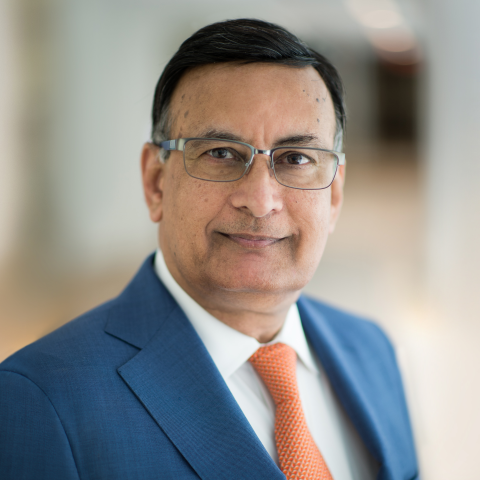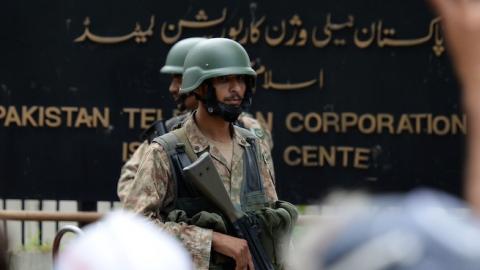Nuclear-armed Pakistan is once again mired in a domestic political crisis. Protesters calling for the resignation of Prime Minister Nawaz Sharif have paralyzed the capital, Islamabad, for the last several days. Their threats of violence have raised the specter of yet another military intervention in a country that has been ruled by the military for long periods of time.
Whatever the outcome of the current imbroglio, it is unlikely that Pakistan will evolve into a fully functioning democracy, with full civilian control over the military, anytime soon.
Sharif was elected barely 15 months ago amid optimism about economic reform and peace with India. His election marked the first transfer of power in Pakistan's history from one civilian to another. But the prime minister squandered some of his political capital by opting to govern through a small coterie of family friends and relatives. His daughter's father-in-law is finance minister while Sharif's brother is chief minister of the largest province, Punjab.
But the challenge to Sharif's survival came as a direct result of his attempt to wrest control of foreign and national security policies from Pakistan's all-powerful army. He spoke of normal trade relations with India, without insisting on resolving the Kashmir dispute first, and argued that Pakistan's interests are better served by staying out of Afghanistan's internal matters.
The policies proposed by Sharif in relation to India and Afghanistan were sensible, but he may have acted in haste and without adequate preparation. The Pakistani military treats civilian initiatives for peace with India as treason and is not willing to revise its policy of seeking Afghan proxies, like the Taliban and the Haqqani network.
The generals are also unhappy about Sharif's decision to put former dictator General Pervez Musharraf on trial for treason.
Cricketer-turned-politician, Imran Khan, and Canada-based cleric Tahir-ul-Qadri were ostensibly encouraged by the military to announce their recent protest campaign, with help from pro-ISI (Inter-Services Intelligence agency) television news channels. Khan's close associate, Javed Hashmi, has now broken ranks with him to speak publicly of secret contacts between Khan and operatives of the ubiquitous ISI.
Most Pakistanis are not surprised by allegations of collusion between the political opposition and some elements within the army. The Pakistani military sees itself as the country's ultimate guardian and does not agree with the need to submit itself to the decisions of, or scrutiny by, elected civilians.
Sharif's civilian predecessor, Asif Ali Zardari, faced down similar machinations with greater skill. Zardari completed his 5-year term as president through compromise, including the willingness to change prime ministers when the judiciary, acting on the military's behest, demanded so.
The army clearly wants to avoid an overt coup. The protests provide it with a fig leaf for acting as the final arbiter in a political deadlock. Both Sharif and Khan have a reputation for stubbornness. The sit-in outside parliament by Khan's hardcore followers, joined by devotees of Qadri, the cleric, provided the perfect setting for a military-brokered settlement.
A similar deadlock with the opposition had resulted in Sharif's resignation in 1993, ending his first term as prime minister prematurely. In 1999, Sharif refused to resign during his second term, resulting in the military coup that brought Musharraf to power.
This time, the prime minister seems reconciled to a protracted battle. He wants to affirm the principles that an elected leader must only be removed from office through another election and that the military must be subservient to the constitutionally established civilian government.
Unfortunately, the realities of Pakistan's politics are too complex to help Sharif uphold what would otherwise seem to be eminently reasonable standards. Khan and Qadri are tapping into discontent within Pakistan's middle class with dynastic leadership and old-school patronage politics. Pakistan's boisterous media, comprising 20-odd 24-hour television news channels, help put out rumors, incite violence and feed religious and ethnic prejudices, making governance difficult.
Many Pakistanis are torn between their support for democracy and civilian control of the military, on the one hand, and their desire for social and political reform, on the other. Just as Sharif is the flawed advocate of democracy, Khan and Qadri's calls for reform have been tainted by their covert ties with the military and its intelligence arms.
In a perfect world, Sharif would open his government to the idea of reform; the Pakistani military would realize that its meddling has not made Pakistan stable; and Khan and Qadri would reach out to the Pakistani people for their votes at the next election instead of trying to pack off another elected parliament way before its term. But Pakistanis live very far from a perfect world.
For now, it seems that Pakistan's generals have already succeeded in clipping Sharif's wings. He will most likely allow Musharraf to proceed abroad and will be too weak to try and assert himself in mending fences with India or Afghanistan.
Meanwhile, Pakistan's economy continues to slide. Almost one-third of its school-going age children remain out of school, and the world continues to see the country as an incubator of Islamist extremism.
Any prospect of coherent Pakistani military action against Jihadi terrorists ensconced in the country's northwest region bordering Afghanistan has also been a major casualty of the anti-Sharif protests.














